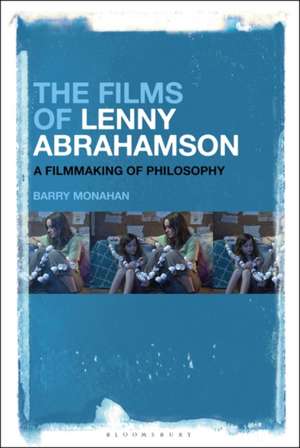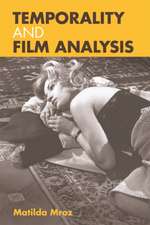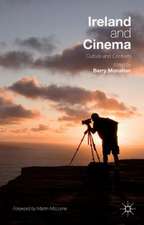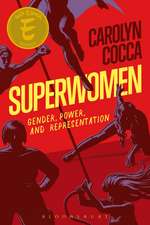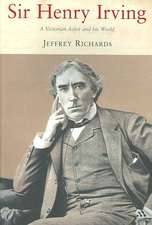The Films of Lenny Abrahamson: A Filmmaking of Philosophy
Autor Barry Monahanen Limba Engleză Hardback – 22 aug 2018
| Toate formatele și edițiile | Preț | Express |
|---|---|---|
| Paperback (1) | 224.11 lei 6-8 săpt. | |
| Bloomsbury Publishing – 19 feb 2020 | 224.11 lei 6-8 săpt. | |
| Hardback (1) | 715.00 lei 6-8 săpt. | |
| Bloomsbury Publishing – 22 aug 2018 | 715.00 lei 6-8 săpt. |
Preț: 715.00 lei
Preț vechi: 1027.93 lei
-30% Nou
Puncte Express: 1073
Preț estimativ în valută:
136.81€ • 143.23$ • 113.21£
136.81€ • 143.23$ • 113.21£
Carte tipărită la comandă
Livrare economică 05-19 aprilie
Preluare comenzi: 021 569.72.76
Specificații
ISBN-13: 9781501316111
ISBN-10: 1501316117
Pagini: 248
Ilustrații: 38 bw illus
Dimensiuni: 152 x 229 x 15 mm
Greutate: 0.5 kg
Editura: Bloomsbury Publishing
Colecția Bloomsbury Academic
Locul publicării:New York, United States
ISBN-10: 1501316117
Pagini: 248
Ilustrații: 38 bw illus
Dimensiuni: 152 x 229 x 15 mm
Greutate: 0.5 kg
Editura: Bloomsbury Publishing
Colecția Bloomsbury Academic
Locul publicării:New York, United States
Caracteristici
Provides original methods to view or review Abrahamson's work theoretically as innovative and avant garde, within the broader context of contemporary Irish cinema
Notă biografică
Barry Monahan is lecturer in Film Studies at the University College Cork, Ireland. He has published Ireland's Theatre on Film: Style, Stories and the National Stage on Screen (2009), and also written on Irish cinema from different theoretical and aesthetic perspectives in various collections of essays, including Screening Irish America (2009), Genre and Cinema: Ireland and Transnationalism (2007), and Viewpoints: Theoretical Perspectives on Irish Visual Texts (2013). He contributes regularly to Estudios Irlandeses, the Spanish Journal of Irish Studies.
Cuprins
TABLE OF CONTENTSIntroduction: Five Contextual Categories: Classifying Cinema in IrelandFour Cinematic Categories: The National and BeyondChapter 1: 3 Joes - The Young Filmmaker and the First Short: MendelChapter 2: Adam and Paul - Celtic Tiger Cinema: From Short Films to FeaturesChapter 3: Garage - A Second Collaboration with Mark O'Halloran Chapter 4: What Richard Did - Characters in ContextChapter 5: Frank - Inside the Head of the Character in Early CinemaChapter 6: Room - Contexts for the Novel and its AdaptationChapter 7: Interview with Lenny Abrahamson (Dublin, 1 June 2014)BibliographyFilmographyIndex
Recenzii
Barry Monahan's book is an insightful treatment of Lenny Abrahamson's cinematic oeuvre, a thorough analysis of Abrahamson's seven films that moves beyond the filmmaker's national context to explore the films' transnational and intertextual inspiration and philosophical concerns. I strongly recommend this perceptive study to anyone interested in the work of this exciting Irish director.
Barry Monahan shows us why Lenny Abrahamson is one of Ireland's most important filmmakers. In shrewd, engaging readings of Abrahamson's oeuvre, Monahan explores the power of cinema to lay bare what it means to be human. An ambitious study that does not disappoint.
For film scholars, teachers and students, The Films of Lenny Abrahamson offers a fascinating auteur study; a useful case study in film and philosophy; and for those with a specific interest in Irish film... The book should further engage teachers and students at a time when film and media studies courses are under pressure to displace intellectual content with technical competence in pursuit of the holy grail of graduate employability. For The Films of Lenny Abrahamson is a wonderful reminder that cinema is capable of thinking; not just about its own forms, genres and styles in some depthless postmodern fashion, but as an art form, able to think with some profundity and complexity about being human.
Barry Monahan shows us why Lenny Abrahamson is one of Ireland's most important filmmakers. In shrewd, engaging readings of Abrahamson's oeuvre, Monahan explores the power of cinema to lay bare what it means to be human. An ambitious study that does not disappoint.
For film scholars, teachers and students, The Films of Lenny Abrahamson offers a fascinating auteur study; a useful case study in film and philosophy; and for those with a specific interest in Irish film... The book should further engage teachers and students at a time when film and media studies courses are under pressure to displace intellectual content with technical competence in pursuit of the holy grail of graduate employability. For The Films of Lenny Abrahamson is a wonderful reminder that cinema is capable of thinking; not just about its own forms, genres and styles in some depthless postmodern fashion, but as an art form, able to think with some profundity and complexity about being human.
